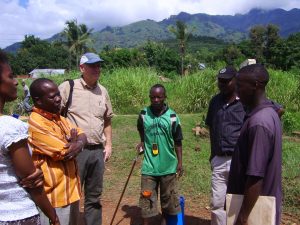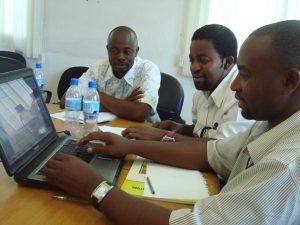Funding: National Institutes of Health, RO1
Years: 2010-2014
Randy Kramer (PI) and Marie Lynn Miranda, Vance Fowler, Katia Koelle, Leonard Mboera, Barry Moser, Clifford Mutero (co-PIs)

Research team conducting fieldwork, Tanzania
This project aimed to improve malaria control outcomes through an implementation science approach that integrates health delivery experiments and decision support modeling to promote joint optimization of vector control and disease management strategies. To implement an evaluation of health delivery experiments, the project conducted a large cluster-randomized health experiment in twenty four villages in the Mvomero district of Tanzania. The study employed a randomized longitudinal factorial design to evaluate one vector management intervention (larviciding) and one disease treatment intervention (home-based management consisting of early RDT detection and treatment by village health workers). Annual malariometric surveying was conducted in order to evaluate any change in malaria infection between intervention groups.

Research team revising household survey, Tanzania
The study also conducted entomological surveys, household surveying, and focus group discussions. Analysis and dissemination efforts are ongoing. The randomized experiments of vector control and disease management strategies in Tanzania will elucidate which intervention strategy combinations are most effective in real world settings, using an implementation science approach.


